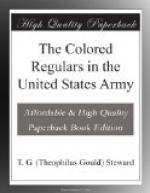and alertly obeying orders, and without becoming excited
when the fire of the enemy reached them.”
The yell, in the charge of the regulars, is a part
of the action, and is no more peculiar to Negro troops
than to the whites, only as they may differ in the
general timbre of voice. Black American soldiers
when not on duty may sing more than white troops, but
in quite a long experience among them I have not found
the difference so very noticeable. In all garrisons
one will find some men more musically inclined than
others; some who love to sing and some who do not;
some who have voices adapted to the production of
musical tones, and some who have not, and it is doubtless
owing to these constitutional differences that we
find differences in habits and expressions.
Lieutenant Miley, of General Shafter’s staff, in his description of the departure of General Shatter from General Garcia’s tent, gives us a glimpse of the character of the men that composed the Cuban army in that vicinity.
“While the interview was going on, the troops were being assembled to do honor to the General on his departure. Several companies were drawn up in front of the tent to present arms as he came out, and a regiment escorted him to the beach down the winding path, which was now lined on both sides by Cuban soldiers standing about a yard apart and presenting arms. The scene made a strong impression on all in the party, there seemed to be such an earnestness and fixedness of purpose displayed that all felt these soldiers to be a power. About fifty per cent. were blacks, and the rest mulattoes, with a small number of whites. They were very poorly clad, many without shirts or shoes, but every man had his gun and a belt full of ammunition.”
B.
EXTRACT FROM A LETTER FROM A SOLDIER OF THE 10TH CAVALRY, TROOP B, CONCERNING THE BATTLE OF LAS GUASIMAS:
“... The platoon which escaped this ditch got on the right of the 1st Cavalry on the firing line, and pushed steadily forward under First Sergeant Buck, being then in two squads—one under Sergeant Thompson. On account of the nature of the ground and other natural obstacles, there were men not connected with any squads, but who advanced with the line.
Both squads fired by
volley and at will, at the command of
the sergeants named;
and their shots reached the enemy and
were effective, as it
is generally believed.
Private W.M. Bunn, of Sergeant Thompson’s squad, is reported to have shot a sharpshooter from a tree just in front of the enemy’s work. Private Wheeler was shot twice in the advance. Sergeant Thompson’s squad was once stopped from firing by General Wheeler’s adjutant-general for fear of hitting the Rough Riders.
It seems that two distinct battles were fought that day. Colonel Wood’s command struck the enemy at about the tame time,




